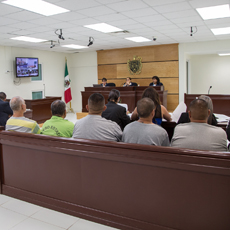 It took the state of Chihuahua 23 years to recognize that it exists in a context of widespread and systematic violence against women that has resulted in cases of disappearance, sexual exploitation, and femicide.
It took the state of Chihuahua 23 years to recognize that it exists in a context of widespread and systematic violence against women that has resulted in cases of disappearance, sexual exploitation, and femicide.
On the night of Saturday July 18, for the first time in the judicial history of the state, a decision was issued that largely recognizes the existence of a femicide in Chihuahua. That night, Judges Maria Catalina Ruiz Pacheco, Emma Terán Murillo and Myrna Luz Pineda Roche issued a decision that charged five of the six plaintiffs guilty of trafficking and aggravated homicide due to gender in the murder trial 267/2014.
After hearing more than 180 witnesses during three months of oral hearings, which included survivors of trafficking, experts on gender violence and relatives of victims, the Court held that Jesus Hernandez Martinez, Cesar Romero Feliz Esparza, Jesus Edgar Villa Regalado, Jose Antonio Contreras Vital Terrazas and Manuel Anguiano are guilty of both offenses.
While Jose Gerardo Alva Bridges was found innocent because the judges found that there was insufficient evidence to prove his guilt, the prosecution failed to appeal.
For mothers of victims, as well as civil society, the ruling represents an important step in the long road that state authorities must travel in order to guarantee women access to justice and a life free from violence in Ciudad Juarez.
It is worth mentioning that while the Special Prosecutor for Crimes of Violence Against Women led the prosecution, the organizations Women’s Roundtable Network and Justice for Our Daughters were present as adjuvants and very close to the families of the victims.
On Tuesday before the ruling was issued, the mothers of the 11 young women, accompanied by social organizations, as well as other mothers of victims, held a demonstration outside the so-called Judicial City, in the border city, to ask the judges for a fair and landmark ruling.
There they reminded onlookers that their daughters’ cases should not be seen as an isolated cases as the names of Mónica Liliana Delgado Castillo, Jessica Terrazas Ortega, Jazmín Salazar Ponce, María Guadalupe Pérez Montes, Lizbeth Avilés García, Perla Ivonne Aguirre González, Idalí Juache Laguna, Beatriz Alejandra Hernández Trejo, Jesica Leticia Peña García, Deisy Ramírez Muñoz y Andrea Guerrero Venzor are part of a long list of hundreds of victims first recorded in 1993.
Last Friday, the defense presented their final arguments and asked the Court to declare the accused innocent.
At the end of the hearing, the judges asked the mothers and relatives if they wanted to speak and express themselves. Susana Montes Rodriguez, mother of Maria Guadalupe Perez Montes, took the floor and asked the Court to consider that the disappearance of her daughter shrank her health and economy and caused the disintegration of her family, as is the case of hundreds of families that face the same hardship.
Norma Laguna, Laguna, mother of Juache Laguna, asked the judges to issue a ruling that “serves as an example for people who want to do the same and want to exploit girls and women, so that they think twice about it.”
“I said to the judges that they (the accused) had the privilege of having their family visit and see them, but we could not see our daughters, for they snatched away our opportunity to embrace them, because they took away their opportunity to hug their family, to realize their dreams,” Laguna said in an interview with Cimacnoticias.
At the hearing, the floor was also given to the accused, who asked to be declared innocent, followed by a recess of 24 hours for final deliberation.
A few minutes after 9 pm on Saturday, the judges began reading their ruling, which took into account what was presented by the organizations that acknowledged the risk women who live in the border city run. At the same time, they expressed that their decision acknowledges various treaties, recommendations and agreements on gender that have been ratified by the Mexican State.
The final hearing ended a few minutes after two o’clock in the morning of Sunday, July 19.
In an interview with this agency, Imelda Marrufo, director of the Women’s Roundtable Network, said that while “the ruling sets an important precedent, organizations can not adopt an attitude of triumph, as the judicial process continues for many other defendants and researchers.”
She explained that there are at least two open proceedings against other defendants, who were even mentioned by witnesses at different stages of the trial. To which she adds that it is still necessary to initiate various processes and research, as the remains of the 11 young women weren’t the only ones found in the area known as the Navajo Arroyo.
It was possible to identify at least 27 victims, plus some remains did not match any of the samples of the database.
“One must also consider the victims recorded since the 90s have not yet seen justice and it is important to mention that during the trial we learned of many young victims of trafficking and femicide of which we have no record, who they were or how they died. This is the magnitude of the problem we are only now beginning to address,” said Marrufo.
Finally she pointed out that it is essential that the Attorney General’s Office investigate the alleged web of corruption and complicity that operated in these cases between the accused and various judicial authorities.
The individualization of decision will take place next Friday when the sentence and years of imprisonment will be handed down to each culprit.
The Women’s Communication and Information Service (Comunicación e Información de la Mujer, CIMAC) is a news agency that produces and publishes articles from a gender perspective in Mexico. See original Spanish article here.
Translated by Nidia Bautista



